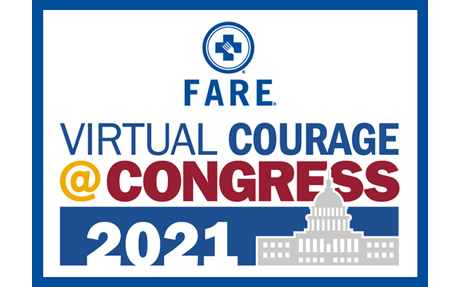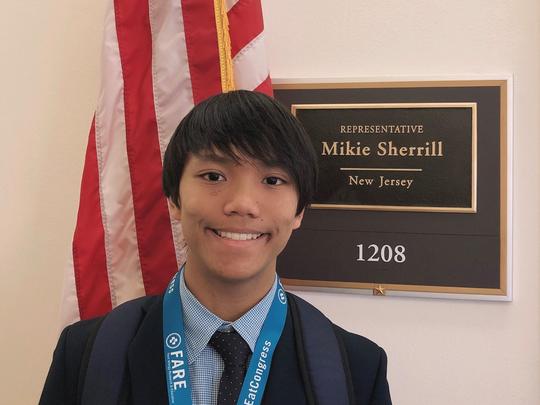Two Years of FARE’s Courage at Congress: Different Ways to Connect, Same Commitment to Label Sesame
“It is our first-hand experience managing food allergies that make us perfect advocates.”
Guest post by Teen Advisory Group (TAG) member Jake DeGuzman

Courage at Congress 2021: Advocate for a Cure was held virtually on March 8-10, 2021, with some of the legislative meetings taking place on March 11 to accommodate the event’s remarkable online participation. Talks, panel discussions and Q&A sessions prepared more than 500 food allergy advocates for more than 200 meetings with federal legislators and staff. Seeking plain-language labeling of sesame on packaged foods, participants thanked their senators for passing the Food Allergy Safety, Treatment, Education & Research (FASTER) Act earlier this month and asked their representatives to cosponsor the House version of the FASTER Act, H.R. 1202. Members of both chambers of Congress were also encouraged to support food allergy research.
Teen Advisory Group (TAG) member and Taekwondo champion Jake DeGuzman shared his experiences as part of Courage at Congress 2021 and at FARE’s inaugural Courage at Congress event, which took place in 2020 shortly before the COVID-19 pandemic cancelled in-person group activities.
In March 2020, before the lockdown began, I went to Washington, D.C., to lobby for the FASTER Act. I remember feeling intimidated by the thought of going to Congress and speaking to legislators and staff. I asked myself, “Can do this, and will I make a difference?” I am a Taekwondo athlete, and this event coincided with my preparations for the World Championships coming in a couple of months. Training had to continue while I was in D.C. I was able to train in the hotel room at night while attending the meetings during the day.

FARE discussions and panels helped me understand what the bill is and what it would accomplish, so I felt well-prepared for the meetings. Dressed professionally and with notes in hand, I entered the Capitol in awe. When we sat down for the first meeting, I was nervous and almost forgot what I had prepared. Then we started sharing our stories, and I felt much better. Everyone at the table had something to contribute. At that moment, I realized that anyone could advocate. Age or lack of experience didn’t matter. What was important was the advocate’s commitment to change. Public speaking is not one of my strengths, but I kept on.
During COVID-19 lockdown, I continued to be persistent by sending emails and setting up follow-up calls. With competitions canceled and a lot of time spent at home, I kept track of the bill's progress. I would update the legislators on the FASTER Act and other food allergy-related issues. For example, I was aware of how safe food was hard to find in supermarkets and how food labeling rules changed during the pandemic. I was pleasantly surprised that the senators’ and representative’s staff appreciated the links I emailed. When online competitions began, USA Taekwondo interviewed me about my advocacy. It was a great way to spread awareness on food allergies within my sport. I never felt alone spreading the word on the FASTER Act, since the FARE staff were always responsive when needed, and there was always support from the food allergy community.
Courage at Congress returned this year in a virtual format, and I participated in one of the panel discussions. I felt more at ease to see many familiar faces, and I did not have to get dressed up. It was interesting to learn about each other’s "WHY?" We all had a moment in our lives that made us realize we had to do something for change to happen. The initiative and drive of the other panelists inspired me, and I was happy to contribute to the conversation.
I thought it would be harder to lobby for the FASTER Act without face-to-face meetings and interaction. I am learning along the way, and nerves can get the best of me. But I still felt the connection because we were all there to deliver the same message as last year. One of the disadvantages we encountered this year was in the planning and brainstorming of ideas. In D.C., we spent a day preparing the order of speakers, our approach, and the flow of the conversation. Without that day to prepare, it was a little tougher to try and keep a steady conversation, but we were able to figure it out. I also missed the camaraderie, meeting new friends in D.C., the brisk spring morning walk to the Capitol building, and the surrealness of the experience. There’s just something empowering about being on Capitol Hill to tell your story.
If you are still wondering if food allergy advocacy is for you, remember that you have what it takes. I hope many more high school and college students join advocacy work. It is our first-hand experience managing food allergies that makes us perfect advocates.
Want to become a FARE Advocate? Learn more here. To ask your legislators to cosponsor the FASTER Act, use the fillable form here.


